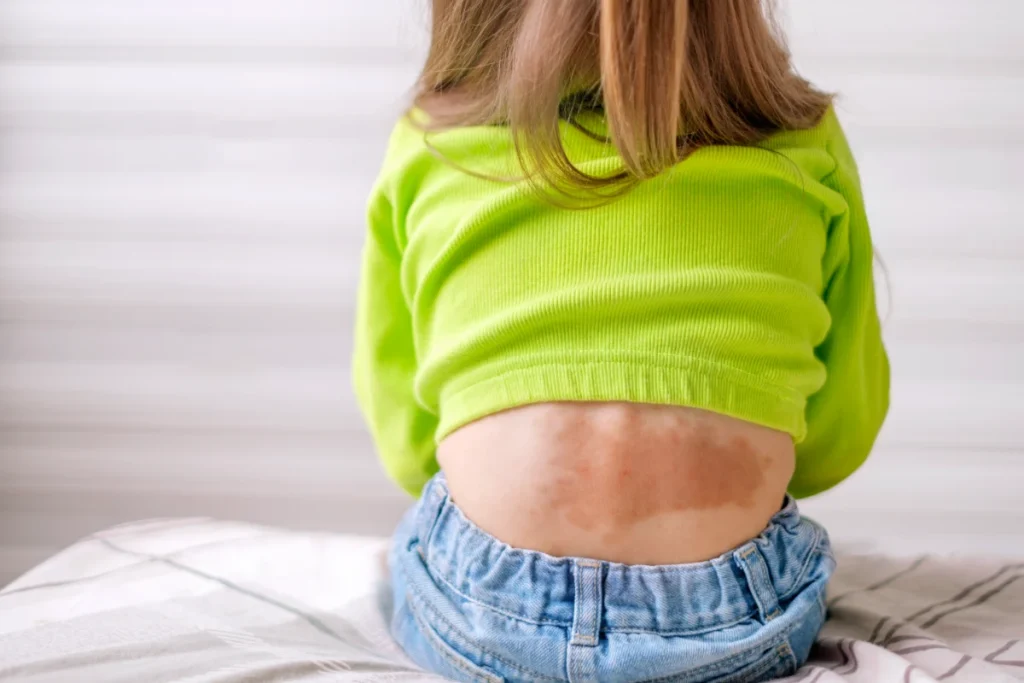Customized Solutions for Pediatric Skin Discoloration
Empowering Confidence Through Compounding

Understanding Skin Discoloration in Children
Personalized Formulations for Skin Discoloration
Through compounding, our skilled pharmacists can create personalized formulations that incorporate the following ingredients known for their effectiveness in treating skin discoloration:
Through compounding, our skilled pharmacists can create personalized formulations that incorporate the following ingredients known for their effectiveness in treating skin discoloration:
- Hydroquinone: Hydroquinone is a widely recognized skin-lightening agent that works by inhibiting the enzyme tyrosinase, which is involved in melanin production. By reducing melanin synthesis, hydroquinone helps to lighten hyperpigmented areas of the skin.
- Kojic Acid: Kojic acid is derived from various fungi and has been used in skincare for its depigmenting properties. It functions by inhibiting tyrosinase activity, thereby reducing melanin production and improving uneven skin tone.
- Azelaic Acid: Azelaic acid possesses both antimicrobial and depigmenting properties. It modulates the production of melanocytes, reducing hyperpigmentation and promoting a more uniform skin tone.
- Vitamin C (Ascorbic Acid): Vitamin C is a potent antioxidant that plays a vital role in skin health. It inhibits melanin synthesis by suppressing the activity of tyrosinase enzymes, resulting in a brighter and more even complexion.
- Retinoids: Retinoids, such as tretinoin or retinol, are vitamin A derivatives that promote skin cell turnover and renewal. They help to fade hyperpigmentation by accelerating the shedding of melanin-laden cells, revealing fresher and more evenly pigmented skin.

Please note that the use of these ingredients and their concentrations should always be determined by a healthcare provider based on an individual’s specific needs and medical history.
References
Grimes PE. The safety and efficacy of salicylic acid chemical peels in darker racial-ethnic groups. Dermatol Surg. 1999;25(1):18-22.
Taylor SC, Cook-Bolden F, Rahman Z, Strachan D. Acne vulgaris in skin of color. J Am Acad Dermatol. 2002;46(2 Suppl Understanding):S98-S106.
Halder RM, Richards GM. Topical agents used in the management of hyperpigmentation. Skin Therapy Lett. 2004;9(6):1-3.
Draelos ZD. Skin lightening preparations and the hydroquinone controversy. Dermatol Ther. 2007;20(5):308-313.
Sarkar R, Arora P, Garg VK, Sonthalia S, Gokhale N. Melasma update. Indian Dermatol Online J. 2014;5(4):426-435.
At Reliant Compounded Solutions, we prioritize the safety and well-being of every patient we serve. While we strive to create customized compounded formulations to address the specific needs of pediatric patients with eczema, it is important to note that not all ingredients may be compatible with every individual.
We understand the complexities of each patient’s medical history, allergies, and sensitivities. Therefore, we advise healthcare providers to reach out to us directly for more information regarding specific ingredients, potential interactions, or any other concerns they may have. Our team of knowledgeable pharmacists can provide additional guidance and support to ensure the most suitable treatment options for their patients.
For more information or to discuss specific cases, please contact us at 203.262.8000 or email us at fairfield@reliantrxs.com. We are committed to working collaboratively with healthcare providers to provide the best possible solutions for pediatric patients with eczema, aiming to alleviate symptoms, improve skin health, and enhance overall well-being.
At Reliant Compounded Solutions, we are dedicated to providing customized compounded formulations and supporting healthcare providers in their efforts to meet the unique needs of each individual patient.
